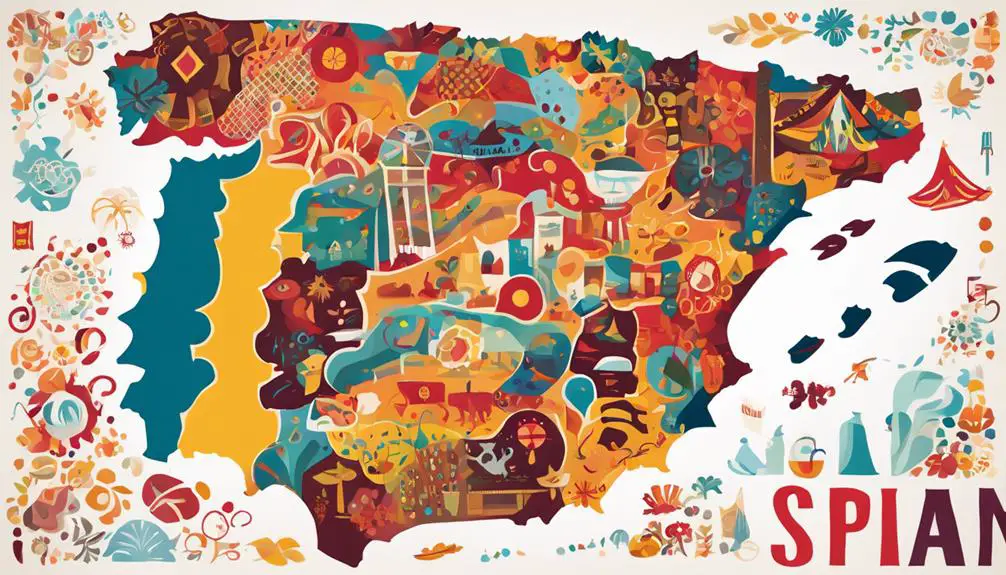You need a reliable Spanish slang translator to navigate the complex web of regional dialects, urban slang, and idiomatic phrases that color the language. Regional dialects influence slang usage and perception, with distinct accents, vocabulary, and grammatical structures in different regions. Understanding common slang expressions like 'hombre' or 'chavo' can aid in connecting with native speakers, but context and tone are vital in slang etiquette. Urban slang blends with hip-hop culture, and idiomatic phrases convey nuanced meanings. As you explore the nuances of Spanish slang, you'll uncover the rich cultural heritage hidden within regional variations.
Understanding Regional Dialects

When exploring the intricacies of Spanish slang, it's essential to acknowledge that regional dialects can greatly influence the way words and phrases are utilized and understood in various regions of the Spanish-speaking world. You'll notice that dialectal variations can greatly impact the way slang is used and perceived.
For instance, a phrase that's commonly used in Argentina might be unheard of in Spain or Mexico. This highlights the importance of understanding linguistic nuances that are unique to each region.
As you delve deeper into the world of Spanish slang, you'll realize that regional dialects are shaped by a combination of historical, cultural, and social factors. You'll encounter distinct accents, vocabulary, and grammatical structures that are peculiar to specific regions.
For example, the use of 'vos' instead of 'tú' in some Latin American countries or the distinct Andean dialect spoken in Bolivia and Peru. By recognizing and appreciating these dialectal variations, you'll become more adept at navigating the complexities of Spanish slang and better equipped to communicate effectively with native speakers from diverse regions.
Common Slang Expressions
As you venture into the world of Spanish slang, you'll encounter a plethora of expressions that are commonly used in everyday conversations, from casual greetings like '?Qué onda?' in Mexico to '?Cómo va?' in Spain. Mastering these expressions will help you better connect with native speakers and navigate social situations with ease.
When it comes to Slang Etiquette, it's essential to understand the context and tone of each expression. For instance, using the phrase 'hombre' (man) or 'chavo' (dude) can add a touch of informality to your conversations, but be cautious not to overuse them.
Similarly, Expressive Insults like 'estás pirado' (you're crazy) or 'estás loco' (you're insane) can be used to add humor or emphasis, but beware of offending someone unintentionally.
Urban Slang and Street Talk

Explore the world of urban slang and street talk, where phrases like 'chido' (cool) in Mexico or 'guay' (cool) in Spain dominate the linguistic landscape. As you immerse yourself in this domain, you'll discover a unique dialect shaped by urban youth culture. In Spain, you'll hear 'guay' used to express admiration, while in Mexico, 'chido' is the go-to phrase for something awesome.
In this world, graffiti culture plays a significant role in shaping the language. You'll see vibrant murals and tags that reflect the community's values and attitudes. Street fashion also has a profound impact, with brands like Adidas and Nike being synonymous with urban style. You'll notice that urban slang often blends with hip-hop culture, influencing the way people express themselves.
You'll hear phrases like 'qué onda' (what's up) or 'no way, José' (no way, man) being thrown around in casual conversations.
As you navigate this linguistic landscape, remember that urban slang is constantly evolving, reflecting the dynamic nature of urban youth culture. By understanding the nuances of urban slang and street talk, you'll gain a deeper appreciation for the vibrant cultural tapestry of Spanish-speaking countries.
Idiomatic Phrases and Proverbs
You'll encounter dozens of idiomatic phrases and proverbs in Spanish that convey nuanced meanings and add flavor to everyday conversations. These expressions often rely on figurative language, making them rich in cultural nuances. When you understand these phrases, you'll gain insight into the Spanish-speaking world's values, beliefs, and way of life.
Idiomatic phrases like 'Tomar el pelo' (to take someone for a ride) or 'Estar la mar de…' (to be extremely…), reveal the creative and humorous side of Spanish language. Proverbs, on the other hand, offer wisdom and advice, such as 'A quien madruga, Dios le ayuda' (God helps those who rise early). These phrases and proverbs not only add flavor to your conversations but also help you connect with native speakers on a deeper level.
As you explore the world of Spanish idioms, remember that cultural nuances underlie each expression. By learning these phrases, you'll gain a deeper understanding of the Spanish-speaking world's history, traditions, and values.
Slang in Different Spanish Regions

Explore the diverse world of Spanish slang, where regional variations reveal distinct cultural identities, and discover how different regions put their unique spin on language.
You'll find that slang in rural areas often reflects the local culture and traditions. For instance, in rural Andalusia, you might hear 'churri' to refer to a friend, while in rural Catalonia, 'xavo' is used to describe something cool. These regional differences are a proof of the rich cultural heritage of each area.
Regional identity is deeply tied to slang, with each region proudly claiming its own unique expressions. In the north, the Basque Country has its own distinct slang, 'euskera,' which is vastly different from the rest of Spain. Meanwhile, in the Canary Islands, 'isleno' slang is shaped by the island's African and Latin American influences.
Online Resources for Slang Translation
With over 100 online resources dedicated to translating Spanish slang, you can now easily decipher the nuances of regional dialects and idioms. You're just a click away from understanding the colloquial expressions and idiomatic phrases used in everyday conversations.
To get you started, here are some online resources that can help you navigate the world of Spanish slang:
| Resource | Description | Features |
|---|---|---|
| SpanishDict | In-depth slang dictionary | Audio pronunciation, example sentences, and verb conjugations |
| Google Translate | Online translator with slang support | Real-time translation, text-to-speech, and offline mode |
| Reverso | Contextual slang translator | Example sentences, synonyms, and a built-in dictionary |
| WordReference | Slang dictionary with forum support | User-generated content, grammar guides, and language forums |
| Linguee | Thorough slang translator with contextual examples | Real-life sentence examples, grammar explanations, and a dictionary |
These online resources are designed to help you learn and understand Spanish slang. From slang dictionaries to online translators, these tools can help you improve your language skills and better connect with native speakers.
Mastering Colloquial Conversations

Mastering colloquial conversations in Spanish requires a deep understanding of the nuances of everyday language, including idiomatic expressions, colloquialisms, and regional dialects that can greatly vary across different countries and cultures.
As you aim to enhance your conversational skills, immersion in cultural contexts is crucial, where you're exposed to authentic language usage in everyday situations. This will help you develop an ear for conversational flow, allowing you to respond naturally and effortlessly in social interactions.
To master colloquial conversations, focus on learning common expressions, idioms, and slang specific to the region you're interested in. Practice active listening to native speakers, paying attention to their tone, pace, and body language.
Engage in conversations with native speakers, either in person or online, to refine your pronunciation, intonation, and comprehension. Remember, the key to mastering colloquial conversations lies in consistent practice and exposure to authentic language usage.
Frequently Asked Questions
Can I Use Google Translate for Spanish Slang Translation?
When you're dealing with Spanish slang, can you rely on Google Translate? Well, you shouldn't count on it. Google's algorithms struggle with colloquial expressions, idioms, and regional dialects. You'll often get inaccurate or incomplete translations. Google's limitations are clear.
Instead, explore online alternatives that specialize in slang translation, offering more accurate and culturally relevant results.
Are There Any Slang Words That Are Universally Understood?
When exploring slang universality, you'll find that some phrases transcend regional boundaries. While local dialects vary, certain global phrases have gained widespread acceptance.
You'll notice that expressions like 'hakuna matata' (no worries) or 'chill out' have become universally understood. These phrases have been adopted globally, often through media and cultural exchange.
As you navigate slang, keep in mind that global phrases can be a great starting point for communication, but local nuances are still essential to master.
How Do I Know if a Slang Term Is Offensive or Inappropriate?
When in Rome, do as the Romans do, but with slang, it's not that simple. You need to be mindful of cultural nuances to avoid offending locals.
To navigate slang etiquette, research the term's origins and connotations. Look for red flags like derogatory language or offensive references.
If you're still unsure, it's better to err on the side of caution and avoid using the term altogether. Remember, respect for cultural differences is key to effective communication.
Can I Create My Own Slang Expressions in Spanish?
You can definitely create your own slang expressions in Spanish, and it's a natural part of language evolution. By crafting personalized lingo, you're contributing to the dynamic nature of language.
Feel free to experiment with words, phrases, and expressions that reflect your personality and cultural background. Just be mindful of your audience and context to make sure your creations are well-received.
Are There Any Cultural Differences in Using Slang in Formal Settings?
As you navigate formal settings in Spanish-speaking countries, you'll encounter cultural differences in using slang. Be mindful of regional norms, as some regions are more accepting of slang in formal tones, while others frown upon it.
In general, it's best to maintain a professional, respectful tone and avoid using slang in formal settings, especially in business or academic environments.
Conclusion
Master the nuances of Spanish slang and regional dialects, and you'll navigate everyday conversations like a native.
You'll decode urban street talk, idiomatic phrases, and regional expressions with ease.
Expand your vocabulary with online resources and practice colloquial conversations.
As you explore the diverse Spanish-speaking world, you'll uncover the richness of Latin American and European cultures.
With each new phrase, you'll bridge the gap between languages and foster deeper connections.







